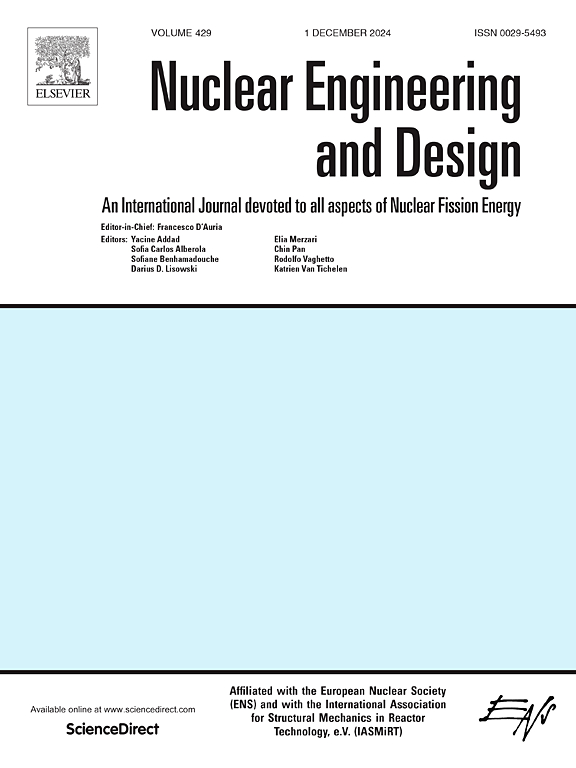氢化钇基核燃料中氢硫输运的敏感性研究
IF 1.9
3区 工程技术
Q1 NUCLEAR SCIENCE & TECHNOLOGY
引用次数: 0
摘要
氢化钇具有较高的氢密度和优异的高温氢化物稳定性,是一种适用于高温核反应堆的优秀固体中子慢化剂材料。尽管有这些吸引人的特性,但当温度梯度存在时,氢在氢化钇中如何表现的细节仍然没有得到很好的理解。由温度梯度引起的氢组成曲线的演变需要氢的输运热的知识,这是该材料尚未测量的一个关键参数。在这项工作中,我们进行了氢化物再分配,氢解离和氢泄漏计算,同时改变氢化钇中氢的sot输运热,以阐明温度梯度下氢化物稳定性对该参数的敏感性。本文分析了一种假设的铀钇氢化核燃料设计在高温液态金属冷却核反应堆运行过程中的氢化物稳定性。假设U-YHx可以以物理稳定的方式制造,这种燃料系统可能在非常高的功率密度和温度下工作时保持氢化物的稳定性。我们发现,尽管随着输运热温度参数的变化,气隙中的氢解离压力确实变化了几个百分点,但在高燃耗燃料循环过程中,U-YHx燃料肉中的氢含量对该参数相对不敏感;这是由于氢化钇在这里考虑的高温条件下具有优异的留氢性能。这表明,在稳态液态金属冷却反应堆条件下,氢化物稳定性分析对U-YHx中Soret输运热的值不敏感。然而,在高温瞬态过程中,由于氢气解离压力与成分和温度的非线性关系,熔覆层内部气体过压诱发应力破裂的敏感性对该参数更为敏感。本文章由计算机程序翻译,如有差异,请以英文原文为准。
Sensitivity study of hydrogen Soret transport in yttrium Hydride-Based nuclear fuel
Yttrium hydride is an excellent solid neutron moderator material for high temperature nuclear reactor applications due to its high hydrogen density and exceptional hydride stability at high temperatures. Despite these attractive characteristics, the details of how hydrogen behaves within yttrium hydride while temperature gradients exist are still not well understood. The evolution of the hydrogen composition profile resulting from a temperature gradient requires knowledge of hydrogen’s heat of transport, a critical parameter that has not yet been measured for this material. In this work, we perform hydride redistribution, hydrogen dissociation, and hydrogen leakage calculations while varying the Soret heat of transport of hydrogen in yttrium hydride to elucidate the sensitivity of hydride stability under temperature gradients to this parameter. This study analyzes hydride stability of a hypothetical uranium-yttrium hydride nuclear fuel design during operation of a high temperature liquid metal-cooled nuclear reactor. Assuming U-YHx could be fabricated in a physically stabilized manner, this fuel system can likely maintain hydride stability while operating at very high power densities and temperatures. We find that even though the hydrogen dissociation pressure in the gas gap does vary by several percent as the heat of transport temperature parameter is varied, the hydrogen content in the U-YHx fuel meat is relatively insensitive to this parameter over the course of a high burnup fuel cycle; this is due to yttrium hydride’s excellent hydrogen retention under the high temperature conditions considered here. This suggests that hydride stability analyses are insensitive to the value of the Soret heat of transport in U-YHx under steady state liquid metal-cooled reactor conditions. However, the susceptibility to internal gas overpressurization-induced stress-rupture of the cladding during a high temperature transient is more sensitive to this parameter due to the non-linear dependence of hydrogen gas dissociation pressure vs. composition and temperature.
求助全文
通过发布文献求助,成功后即可免费获取论文全文。
去求助
来源期刊

Nuclear Engineering and Design
工程技术-核科学技术
CiteScore
3.40
自引率
11.80%
发文量
377
审稿时长
5 months
期刊介绍:
Nuclear Engineering and Design covers the wide range of disciplines involved in the engineering, design, safety and construction of nuclear fission reactors. The Editors welcome papers both on applied and innovative aspects and developments in nuclear science and technology.
Fundamentals of Reactor Design include:
• Thermal-Hydraulics and Core Physics
• Safety Analysis, Risk Assessment (PSA)
• Structural and Mechanical Engineering
• Materials Science
• Fuel Behavior and Design
• Structural Plant Design
• Engineering of Reactor Components
• Experiments
Aspects beyond fundamentals of Reactor Design covered:
• Accident Mitigation Measures
• Reactor Control Systems
• Licensing Issues
• Safeguard Engineering
• Economy of Plants
• Reprocessing / Waste Disposal
• Applications of Nuclear Energy
• Maintenance
• Decommissioning
Papers on new reactor ideas and developments (Generation IV reactors) such as inherently safe modular HTRs, High Performance LWRs/HWRs and LMFBs/GFR will be considered; Actinide Burners, Accelerator Driven Systems, Energy Amplifiers and other special designs of power and research reactors and their applications are also encouraged.
 求助内容:
求助内容: 应助结果提醒方式:
应助结果提醒方式:


